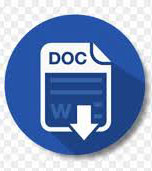DEVELOPING ENGLISH LEARNING MATERIALS FOR HOUSEKEEPING FOR ELEVENTH-GRADE STUDENTS IN FIRST SEMESTER AT SMKN 1 SINGARAJA
Abstract
References
Angga, T. D. (2016). Designing ESP materials of English Tourism subject at English Education and Training Program of Uniska Banjarmasin.
Ariyanthi, K. E., Putra, I. N. A. J., & Suarcaya, P. (2020). English learning materials for restaurant students at Apollonia Hotel School. Journal of Education Research and Evaluation, 4(3), 252. https://doi.org/10.23887/jere.v4i3.26107
Bolderston, A. (2012). Conducting a Research Interview. Journal of Medical Imaging and Radiation Sciences, 43(1): 66-76.
Brow, R., & Raza , K. (2020). Materials Development in EALP Legal Writing Courses. Language Teaching Research Quarterly , 15, 3349.
Fadlia, F., Zulida, E., Asra, S., Rahmiati, R., & Bania, A. S. (2020). English subject on English for Specific Purposes (Esp) in vocational schools. Language Literacy: Journal of Linguistics, Literature, and Language Teaching, 4(2), 358367.
Fitria, T. N. (2020). Teaching English for Specific Purposes (ESP) to the students in English Language Teaching (ELT). Journal of English Teaching Adi Buana, 5(01).
Harsono, Y. M. (2007). Developing learning materials for specific purposes. TEFLIN Journal-A Publication on the Teaching and Learning of English, 18(2), 169-178.
Haryudin, A., Yana, Y., & Efransyah, E. (2020). An Analysis of Developing English Teaching Materials at the Vocational High School in Cimahi. Jurnal Ilmiah P2M STKIP Siliwangi, 7(1), 11-19.
Hutchinson, T., & Waters, A. (1987). English for Specific Purposes: A Learner-Centered Approach. Cambridge: Cambridge University Press. http://dx.doi.org/10.1017/CBO9780511733031
Kusumarasdyati. (2014). Challenges in material development. TEFLIN International Conference, 299302.
Kusumawardani, T. (2019). Material Development of English for Specific Purposes (ESP) for Tourism Program at Vocational School 6 of Surabaya Indonesia. Journal of Modern Education Review, 9(5), 367378.
Laadem, M., & Mallahi, H. (2019). Multimodal Pedagogies in Teaching English for Specific Purposes in Higher Education: Perceptions, Challenges and Strategies. International Journal on Studies in Education, 1(1): 33-38.
Liu, Y., & Huc, G. (2021). Mapping the field of English for specific purposes (1980-2018): A co-citation analysis. Elsevier, 91-116. DOI: https://doi.org/10.1016/j.esp.2020.10.003.
Litz, D. R. A. (2005). Textbook evaluation and ELT management a south korean case study.
Retrieved from http://www.asian-efljournal.com/Litz_thesis.pdf
Marcu, N. A. (2020). Designing Functional ESP (English for Specific Purposes) Courses.
Procedia Manufacturing, 308-312.
Meliawati, M., & Hamied, F. A. Analisis Konten pada Buku Teks Bahasa Inggris untuk Kelas X Berjudul Bahasa Inggris untuk SMA/MA/SMK/MAK Kelas X. Jurnal Penelitian Pendidikan, 20(1), 83-90.
Miles, M. B., & Huberman, A. M. (1994). Qualitative Data Analysis. In SAGE Publications. Morgan, H. (2022). Conducting a Qualitative Document Analysis. The Qualitative Report,
(1), 64-77. https://doi.org/10.46743/2160-3715/2022.5044
Muliyah, P., & Aminatun, D. (2020). Teaching English for Specific Purposes in Vocational High School: Teachers Beliefs and Practices. Journal of English Teaching, 6(2), 122–133. Osin, R.F., & Purwaningsih. (2020).
Nunan, D. (1988). Language Teaching-Syllabus Deisgn. Oxford Univeristy Press. https://vulms.vu.edu.pk/Courses/ENG522/Downloads/David Nunan - Syllabus Design (1988, Oxford University Press).pdf
Rahayuningsih, D. (2016). Student teachers challenges in developing teaching materials during teaching practicum in vocational. Journal of English and Education, 4(2), 2434.
Rizal, S. (2019). Desain Pengembangan Bahan Ajar English For Spesific Purposes Berbasis Study Islam Dalam Matakuliah Bahasa Inggris Perguruan Tinggi Keagamaan Islam. Nuansa: Jurnal Studi Islam dan Kemasyarakatan, 12(1).
Rumekso. (2005). Housekeeping Hotel Floor Section. Yogyakarta: CV Andi Offset
Salmani-Nodoushan, M. A. (2020). English for Specific Purposes: Traditions, Trends, Directions. Studies in English Language and Education, 7(1): 247-268.
Septiana, I. (2018). The Challenges of Teaching for English Specific Purposes in Higher Education. Jurnal Ilmiah Bina Bahasa, 11(1), 2231.
Sholichah, N., & Ristati. (2020). An Analysis of English Material for Tourism Industry at Vocational High School 4 Sampit Based on ESP Approach. International Conference on English Language Teaching (INACELT), 141- 150.
Sudipa, I. N., Aryati, K. F., Susanta, I. P. A. E., & Anggayana, I. W. A. (2020). The Development of Syllabus and Lesson Plan Based on English for Occupational Purposes. International Journal of Psychosocial Rehabilitation, 24(4): 291- 300. DOI: https://doi.org/10.37200/IJPR/V24I4/PR201009/
Sugiyono. (2017). Metode Penelitian & Pengembangan (Research and Development).
Bandung: Alfabeta.
Suharto, G. (2006). Pengukuran Penilaian Hasil Belajar Bahasa Inggris.
Yogyakarta: P3B UNY
Suliadi, (2020). Developing English Learning Materials for Students Vocational High School of Fishery Major. (Doctoral dissertation, State Islamic Institute (IAIN) Parepare).
Tomlinson, Brian (2011). Material development in Language Teaching (2 Ed.).Cambridge: Cambridge University Press.
Walsh, N., & Cullen, B. (2021). Materials Development Frameworks and the Challenges of Developing Learning Materials. JALT Postconference Publication, 2020(1): 300.
Wibawa, et al. (2021). Developing English for front office learning materials. The Art of Teaching English as a Foreign Language. 2(1): 52-62. DOI: 10.36663/tatefl.v2i1.103
Widodo, H. P. (2016). Teaching English for Specific Purposes (ESP): English for Vocational Purposes (EVP). English Language Education 5: 277-290. DOI: 10.1007/978- 3-319-38834-2_19.
DOI: https://doi.org/10.35194/jj.v11i2.3631
Refbacks
- There are currently no refbacks.

This work is licensed under a Creative Commons Attribution-ShareAlike 4.0 International License.
JOEPALLT INDEXED BY :
Fakultas Keguruan dan Ilmu Pendidikan Prodi Bahasa Inggris Universitas Suryakancana, Jl. Pasir Gede Raya-Cianjur, 43216.


3.png)












